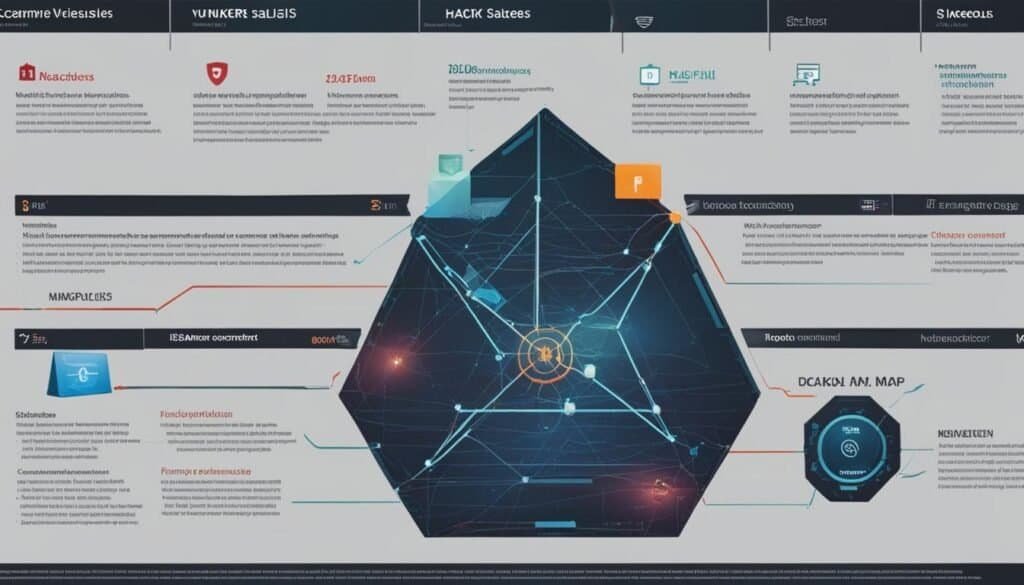As technology continues to advance, so do the methods and techniques used by hackers to gain unauthorized access to computer systems and networks. It’s important to have a solid understanding of how hacking works in order to protect yourself and your digital assets. In this guide, I will walk you through the basics of hacking, different hacking methods and techniques, common hacker tools, and the concept of ethical hacking. By the end, you’ll have a clearer understanding of the cyber threats that exist and the importance of cybersecurity in today’s digital world.
Key Takeaways:
- Understanding how hacking works is crucial in protecting your digital assets.
- Hacking can be both malicious and ethical.
- Common hacking techniques include social engineering, password cracking, and malware attacks.
- Ethical hackers play a vital role in securing systems and networks.
- Cyberattacks, such as data breaches and ransomware attacks, highlight the importance of effective cybersecurity measures.
The Role of Ethical Hackers in Securing Systems
Ethical hackers play a crucial role in securing systems and networks from unauthorized access and potential cyberattacks. They leverage their hacking skills and knowledge to proactively identify system vulnerabilities and weaknesses that can be exploited by malicious hackers. By conducting authorized hacking tests, ethical hackers are able to discover potential entry points and security flaws, enabling organizations to promptly fix these issues and enhance their overall security posture.
One of the key contributions of ethical hackers is their ability to simulate real-world cyberattacks and identify vulnerabilities before they can be exploited by cybercriminals. By adopting the mindset of a hacker, ethical hackers can think and act like attackers, allowing them to identify system weaknesses that may go unnoticed by traditional security measures. Through their efforts, organizations are able to implement appropriate security controls and measures to prevent unauthorized access and protect their sensitive data.
Moreover, ethical hackers also play a crucial role in raising awareness about cybersecurity within organizations. By highlighting the vulnerabilities and potential risks associated with specific systems and networks, ethical hackers help organizations understand the importance of maintaining robust security protocols. They can provide valuable insights and recommendations on how to improve security practices, helping organizations stay one step ahead of cyber threats.
In summary, ethical hackers are vital in the ongoing battle against cybercrime. Their expertise and knowledge are essential in identifying system vulnerabilities, improving security, and bolstering the overall cybersecurity posture of organizations. By continuously challenging and testing systems, ethical hackers contribute to a safer digital environment, ensuring that unauthorized access and potential cyberattacks are mitigated effectively.
Common Hacking Techniques and Tools

When it comes to hacking, there are various techniques and tools that hackers employ to gain unauthorized access to systems and networks. Understanding these methods is essential for organizations to protect themselves against potential cyberattacks. Let’s take a closer look at some of the most common hacking techniques and tools.
Social Engineering
Social engineering is a technique where hackers manipulate individuals to obtain sensitive information. They may use tactics such as phishing emails, phone calls posing as trusted entities, or even impersonating someone in person. By exploiting human psychology and trust, hackers can trick people into revealing passwords, account details, or other confidential information.
Password Cracking
Password cracking is the process of gaining unauthorized access to a system by guessing or cracking passwords. Hackers use software or algorithms that systematically try different combinations of characters until they find the correct password. Weak passwords or those that are easily guessable, such as common words or simple number sequences, are particularly vulnerable to password cracking attacks.
Malware Attacks
Malware attacks involve the use of malicious software to gain control over a system. Hackers distribute malware through various means, such as infected email attachments, compromised websites, or downloads from untrusted sources. Once the malware is executed, it can perform a range of actions, including stealing sensitive information, encrypting files for ransom, or creating backdoors for future access.
Network Vulnerability Exploitation
Hackers often exploit vulnerabilities in network systems to gain unauthorized access. These vulnerabilities can include unpatched software, misconfigured network devices, or weak encryption protocols. By identifying and exploiting these weaknesses, hackers can infiltrate a network and gain control over connected devices, compromising the security of the entire system.
It’s important for organizations to stay vigilant and implement robust security measures to defend against these hacking techniques. Regular vulnerability assessments, employee training on cybersecurity best practices, and the use of strong authentication methods can help reduce the risk of unauthorized access and protect sensitive data.
Real-World Examples of Cyberattacks
Cyberattacks have become increasingly prevalent in today’s digital landscape. These attacks pose a significant threat to individuals, organizations, and even governments. Understanding the real-world examples of cyberattacks can shed light on the tactics used by hackers and the devastating consequences they can have.
One common type of cyberattack is a data breach, where sensitive information is compromised and stolen. This can include personal data, financial records, or even classified government information. Data breaches can result in significant financial losses, reputational damage, and potential legal consequences.
Another example is ransomware attacks, where hackers encrypt a victim’s files and demand a ransom for their release. These attacks can disrupt operations, cause financial losses, and lead to data loss if the ransom is not paid.
“Cyberattacks have become increasingly sophisticated, with hackers employing advanced techniques and tools to infiltrate systems and networks.” – Cybersecurity Expert
DDoS (Distributed Denial of Service) attacks are another prevalent form of cyberattack. In these attacks, hackers overwhelm a system with a flood of traffic, rendering it inaccessible to legitimate users. DDoS attacks can paralyze websites, online services, and even entire networks.
| Type of Cyberattack | Description |
|---|---|
| Data Breach | Unauthorized access and theft of sensitive information. |
| Ransomware | Hackers encrypt files and demand a ransom for their release. |
| DDoS Attack | Overwhelming a system with traffic to render it inaccessible. |
| Hacking Incident | Unauthorized access to systems or networks for various purposes. |
Understanding Ethical Hacking Competitions
Ethical hacking competitions, also known as Capture the Flag (CTF) events, have become popular platforms for individuals or teams to showcase their cybersecurity skills and compete in hacking challenges. These competitions simulate real-world hacking scenarios, allowing participants to test and develop their hacking techniques while enhancing their cybersecurity knowledge.
CTF events offer a range of hacking challenges that cover various aspects of cybersecurity, including network security, web application security, cryptography, reverse engineering, and more. Participants are tasked with solving complex problems and vulnerabilities, requiring them to think critically and creatively to overcome these challenges.
Participating in ethical hacking competitions not only helps individuals improve their hacking skills, but it also provides an opportunity to learn new strategies and stay updated on the latest cybersecurity trends. These events encourage participants to think like hackers, enabling them to better understand the techniques and tools that malicious hackers may use. They also offer a platform for networking with like-minded individuals, fostering a sense of community and collaboration within the cybersecurity field.
Benefits of Ethical Hacking Competitions
- Develop and refine cybersecurity skills
- Enhance problem-solving and critical thinking abilities
- Stay updated with the latest cybersecurity trends and techniques
- Opportunity to network and collaborate with cybersecurity professionals
- Showcase and validate cybersecurity talents
Skills Required to Become an Ethical Hacker

Becoming an ethical hacker requires a diverse skill set that combines technical knowledge and practical expertise. Here are some essential skills that aspiring ethical hackers should develop:
- Programming Knowledge: Proficiency in programming languages such as Python, C++, or Java is crucial for understanding software vulnerabilities and exploiting them effectively.
- Networking Skills: Ethical hackers need a solid understanding of networking protocols, network architecture, and security measures to identify and secure network vulnerabilities.
- Database Understanding: A thorough understanding of databases and data structures is necessary to analyze and protect sensitive information stored in databases.
- Hacking Tools Proficiency: Ethical hackers should be familiar with various hacking tools and software to effectively identify and exploit vulnerabilities in systems and networks.
In addition to these technical skills, ethical hackers should also possess strong problem-solving abilities, attention to detail, and the ability to think creatively. They must constantly stay updated on the latest hacking techniques and cybersecurity trends to stay ahead of cybercriminals. Furthermore, a deep understanding of cybersecurity principles and best practices is essential to ensure the systems they protect are secure.
The Importance of Ethical Hacking Skills
“Ethical hacking skills are crucial in the fight against cybercrime. As more industries become digitally dependent, the need for skilled ethical hackers continues to grow. With their expertise, ethical hackers play a vital role in securing systems and preventing potential cyberattacks.”
By honing their skills in programming, networking, database management, and hacking tools, individuals can prepare themselves for a career as an ethical hacker. Continuous learning, hands-on practice, and participation in ethical hacking competitions can further enhance their skills and provide valuable experience in real-world scenarios.
Overall, the skills required to become an ethical hacker are multidimensional, encompassing technical knowledge, problem-solving abilities, and a deep understanding of cybersecurity principles. With these skills, ethical hackers can make a significant impact in safeguarding systems and networks from malicious attacks, contributing to a safer and more secure digital landscape.
Conclusion
Understanding how hacking works is essential in today’s digital world where cyberattacks are becoming more sophisticated. As an ethical hacker, I play a vital role in identifying vulnerabilities and protecting systems and networks from malicious attacks.
By continuously learning and improving my skills, I can stay one step ahead of cybercriminals and contribute to a safer online environment. It is important for organizations and individuals to prioritize cybersecurity and take proactive measures to secure their data and systems.
With the increasing frequency of cyberattacks, it is crucial for everyone to be aware of the potential threats and the importance of maintaining robust security measures. By working together, we can create a stronger defense against hackers and ensure the safety of our digital assets.
Can Hacking Be Used for Beneficial Purposes?
Hacking’s practical applications have proven to be beneficial in certain scenarios. Ethical hacking, also known as white hat hacking, involves using hacking techniques to identify and fix vulnerabilities in computer systems or networks. By exposing weaknesses, ethical hackers contribute to strengthening security measures and preventing malicious attacks. Additionally, governments and organizations often employ these skilled professionals to ensure the safety of critical infrastructures and confidential data. Overall, hacking’s practical applications can be utilized for positive and necessary purposes in today’s digital landscape.
FAQ
What is hacking?
Hacking refers to unauthorized access into computer systems or networks with the intention of exploiting weaknesses or causing harm.
What is ethical hacking?
Ethical hacking, also known as white hat hacking, is a practice where experts aim to identify vulnerabilities in systems and networks in order to improve their security and prevent unauthorized access.
How do ethical hackers contribute to cybersecurity?
Ethical hackers play a crucial role in securing systems and networks from unauthorized access and potential cyberattacks. By conducting authorized hacking tests, ethical hackers are able to discover potential entry points and security flaws, allowing organizations to fix these issues and enhance their overall security posture.
What are some common hacking techniques?
Common hacking techniques include social engineering, password cracking, and malware attacks.
What are hacking tools?
Hacking tools range from simple scripts to sophisticated software programs that are specifically designed to exploit network vulnerabilities.
Can you give examples of cyberattacks?
Examples of cyberattacks include data breaches, ransomware attacks, and Distributed Denial of Service (DDoS) attacks.
What are ethical hacking competitions?
Ethical hacking competitions, also known as Capture the Flag (CTF) events, are platforms where individuals or teams can compete in hacking challenges to test and develop their cybersecurity skills.
What skills are required to become an ethical hacker?
Essential skills for ethical hackers include programming knowledge, networking skills, database understanding, and proficiency in hacking tools.




